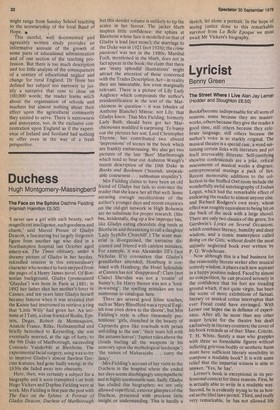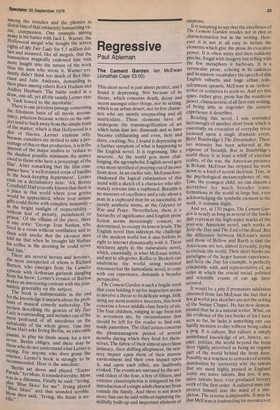Lyricist
Benny Green
The Street Where I Live Alan Jay Lemer (Hodder and Stoughton E6.50) Bookibecome indispensable for all sorts of reasons, some because they are masterworks, others because they give the reader a good time, still others because they celebrate language, still others because the author's voice is so starkly original. The musical theatre is a special case, a word sustaining certain links with literature and yet itself irrevocably illiterate. Self-justifying ' showbiz confessionals are a joke, critical assessments of musical works a disgrace, entrepreneurial musings a pack of lies. Recent memorable additions to the collection in the Stuffed Owl room include the wonderfully awful autobiography of Joshua Logan, which had the remarkable effect of endearing the reader to almost anyone else, and Richard Rodgers's own story, whose effect was roughly equivalent to being hit on the back of the neck with a large shovel. There are only two classics of the genre, Ira Gershwin's Lyrics on Several Occasions, which combines literacy, humility and deep wisdom, and a comic masterpiece called Bring on the Girls, without doubt the most unjustly neglected book ever written by p. G. Wodehouse.
Now although this is a bad business for the reasonably literate seeker after musical comedy wisdom, it places each new aspirant in a happy position indeed. Faced by almost no competition, he can proceed serenely in the confidence that his feet are treading ground which, if not quite virgin, has been the scene of more exhibitions of factual, literary or musical coitus interruptus than ever Freud could have envisaged. With Lerner our hopes rise in defiance of experience. After all, he more than any other major lyricist for the theatre has dealt exclusively in literary counters; the cover of his book reminds us of that: Shaw, Colette, T. H. White. Surely a man who grapples with three so formidable figures without inflicting grievous bodily or aesthetic harm must have sufficient literary sensibility to compose a readable book? It is with some relief that the impartial witness is able to answer, 'Yes, he has'.
Lerner's book is exceptional in its professional context for three reasons. First, he is actually able to write in a readable way. Second, he is evidently trying to be as hon est as the libel laws permit. Third, and really very remarkable, he has not allowed life among the trendies and the phonies to divest him of that eminently humanising virtue, compassion. One example among many is his barter with Jack L. Warner, the Hollywood mogul who bought the screen rights of My Fair Lady for 5.5 million dollars and assumed, like all moguls, that the transaction magically endowed him with more insight into the nature of the work than the men who wrote it. Warner evidently didn't think too much of Rex Harrison and Julie Andrews, demanding in their place among others Rock Hudson and Audrey Hepburn. The battle ended in a draw, one-all, yet all the saintly Lerner says is, 'Jack bowed to the inevitable'. There is one priceless passage concerning the felonious basis of all movie accountancy, priceless because writers on the subject tend to back away from the simple truth of the matter, which is that Hollywood is a den of thieves. _Lerner explains why, because outsiders are invited to take a percentage of this or that production, it is in the interest of the major studios to 'reduce to the shadiest possible minimum the money owed to those who have a percentage of the film'. After remarking that the film companies have 'a well-trained corps of bandits in the book-keeping department', Lerner ends on a declamatory note: 'A h, Bernie Cornfield! Had you only known that there is a place in this world where your genius would be appreciated, where your unique gifts could thrive with complete immunity — in the bright sunlight of respectability — Without fear of penalty, punishment or prison.' Of the villains of the piece, there is one critic: 'George Jean Nathan, who lived in a room without ventilation and so thick with smoke that the elevator man told me that when he brought Mr Nathan his coffee in the morning he could never find him.'
There are several heroes and heroines, the most unexpected of whom is Richard Burton, who emerges from the Camelot episode with Arthurian garlands dangling from his brow; Lerner's version of Burton makes an interesting contrast with the journalistic generality on the subject. The book is indispensable in the end for the knowledge it imparts about the problems of musical comedy authorship. The section describing the genesis of My Fair Lady is outstanding, and includes one of the Most profound of all anecdotes on the nebulosity of the whole genre. One day Moss Hart asks Irving Berlin, an execrable Pianist, to play his finale music for a new revue. Berlin obliges, and there may be those who do not understand what Lerner is saying. For anyone who does grasp the essence, Lerner's book is strongly to be recommended. Here is the anecdote: 'Berlin sat down and played "Easter Parade' for Moss. It sounded terrible. Moss was in a dilemma. Finally he said: "Irving, Play 'Blue Skies' for me". Irving played "Blue Skies" and that sounded terrible. Moss then said, "Irving, the finale is terrific,'



































 Previous page
Previous page